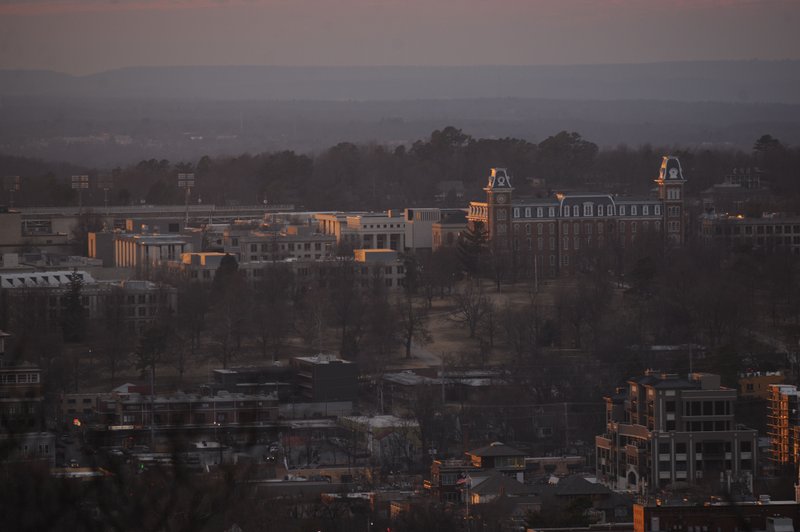FAYETTEVILLE -- Two cases have been opened by federal investigators into the handling of sexual violence complaints by the University of Arkansas at Fayetteville.
No details were released Wednesday by the U.S. Department of Education's Office for Civil Rights, but a UA spokesman wrote that the investigation is looking into issues that date back to 2014.
Colleges and universities receiving federal funding are prohibited from sex discrimination under what is known as Title IX. In recent years, federal authorities have emphasized that, under Title IX, colleges and universities have a responsibility to react appropriately to complaints of sexual violence.
"OCR has advised the university that it is seeking information as to whether the university adequately responded to three Title IX-related matters arising in 2014," UA spokesman Mark Rushing wrote in an email. "We are fully cooperating with OCR in its investigation."
The two cases made public Wednesday have been added to a list updated weekly that now includes 228 cases at 181 post-secondary institutions. UA is the only school in Arkansas on the list.
"If there are problems that need to be addressed, they absolutely should be addressed, because survivors should be our first priority," said Rep. Greg Leding, D-Fayetteville.
Leding serves as house chairman of the Arkansas Legislative Council Higher Education Subcommittee. He has filed an interim study to gather more information about sexual assault at universities in Arkansas.
UA "should absolutely have a chance to defend itself, and I would encourage everyone to keep an open mind," Leding said.
Both cases were opened April 21, according to the federal Department of Education. Rushing said UA was informed of the investigation Tuesday.
Investigations undertaken by the Office for Civil Rights may examine whether schools respond promptly to reports of sexual violence as well as whether they do so effectively. They also can look at whether a school violates sex discrimination laws by creating a hostile environment that limits or denies students the ability to participate in educational programs.
"As a part of our commitment to maintain a safe educational environment free from all forms of sexual intimidation and exploitation, we have sought to go above and beyond federal requirements with respect to training, prompt and thorough investigation and fair adjudication of Title IX cases, and in providing related support," Rushing wrote.
In response to an August query from the Arkansas Democrat-Gazette made under federal disclosure laws, the Office for Civil Rights confirmed in October that it had records of Title IX complaints regarding UA.
The office declined to release the records, stating that the records "are a part of complaints that are currently under investigation by the OCR."
An Office for Civil Rights investigation sometimes ends with a finding of insufficient evidence of a Title IX violation. Other times, federal authorities may enter into a resolution agreement with a university to address a lack of Title IX compliance.
An analysis by The Chronicle of Higher Education found that Office for Civil Rights cases are piling up and, on average, are taking more than a year to resolve.
UA has come under criticism in the past for its handling of sexual violence cases. Last year, Sen. Kirsten Gillibrand, D-N.Y., and Sen. Claire McCaskill, D-Mo., cited "ignorance" by UA hearing officers for their "uninformed" questioning of a student who had reported a rape.
The senators spoke at an event hosted by Vice, an HBO news program, where they watched video taken by a student with hidden equipment.
The student had reported being raped by another student, and the video was from when she appeared before a UA panel as part of the university's judicial process for responding to sexual violence involving students.
At UA and other universities, students may choose to go through a university judicial process that is separate from any police investigation. The UA process involves appearing before a hearing panel that determines whether a student is responsible for sexual misconduct, with sanctions imposed that may include expulsion.
McCaskill, a former county prosecutor, objected to a question about bruising, saying that the UA panelist "tried to intimate that clearly she didn't fight hard enough when her arms weren't bruised." McCaskill described the panelist's question as "just ignorance."
The panel did find a student responsible for misconduct in the case and imposed a sanction of expulsion, but UA also came under criticism for what it said was a mistake in response to his appeal.
UA issued an appeal letter that would have allowed the student to receive his degree if he completed counseling and community service requirements. The university said a media inquiry led to the discovery that the decision had been issued by mistake, and UA upheld the original expulsion decision.
Metro on 04/28/2016

